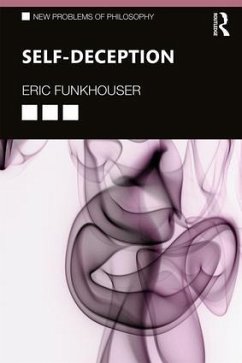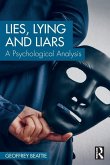Self-deception poses longstanding and fascinating paradoxes. Philosophers have questioned whether, and how, self-deception is even possible; evolutionary theorists have debated whether it is adaptive. For Sigmund Freud self-deception was a fundamental key to understanding the unconscious, and from The Bible to The Great Gatsby literature abounds with characters renowned for their self-deception. But what exactly is self-deception? Why is it so puzzling? How is it performed? And is it harmful?
In this thorough and clearly written introduction to the philosophy and psychology of self-deception, Eric Funkhouser examines and assesses these questions and more:
Clarification of the conceptual background and "Basic problem" of self-deception, including Freud and Davidson and the important debate between intentionalists and motivationalists Deflationary accounts that appeal to cognitive and motivational biases, with emphasis on how motives and emotions drive self-deception Intentional self-deception and the "divided mind," including the role of the unconscious in recent psychological research Challenges that self-deception poses for philosophy of mind and psychology, especially for our understanding of intention, belief, and deceptionBiology and moral psychology of self-deception: Is self-deception functional or beneficial? Are the self-deceived to be held accountable?
Combining philosophical analysis with the latest psychological research, and including features such as chapter summaries, annotated recommended reading and a glossary, Self-Deception is an excellent resource for students of philosophy of mind and psychology, moral psychology and ethics, as well as those in related fields such as psychology and cognitive science.
In this thorough and clearly written introduction to the philosophy and psychology of self-deception, Eric Funkhouser examines and assesses these questions and more:
Clarification of the conceptual background and "Basic problem" of self-deception, including Freud and Davidson and the important debate between intentionalists and motivationalists Deflationary accounts that appeal to cognitive and motivational biases, with emphasis on how motives and emotions drive self-deception Intentional self-deception and the "divided mind," including the role of the unconscious in recent psychological research Challenges that self-deception poses for philosophy of mind and psychology, especially for our understanding of intention, belief, and deceptionBiology and moral psychology of self-deception: Is self-deception functional or beneficial? Are the self-deceived to be held accountable?
Combining philosophical analysis with the latest psychological research, and including features such as chapter summaries, annotated recommended reading and a glossary, Self-Deception is an excellent resource for students of philosophy of mind and psychology, moral psychology and ethics, as well as those in related fields such as psychology and cognitive science.
"This new book on self-deception by Eric Funkhouser is not a treatise but an introduction to and survey of the field of study. As such, it is the first of its kind and the first book of any sort to be published on self-deception for quite some time. It will be particularly useful for people new to the field, partly for the good job it does of bringing presentable order to the variety of accounts of self-deception that have proliferated in recent decades. But it is also well worth reading for advanced researchers for its very detailed, observant and balanced commentary on a variety of theories and for its many sharp criticisms." - Kevin Lynch, Philosophy
"This book on the perennial and fateful paradox of cognitive dissonance is a philosophical tour de force. It skillfully lays out the general structure of the problems of 'self-deception', integrating philosophical analysis with relevant work in the social sciences. This makes the author's own critique especially illuminating. It deserves to become a standard work." - David Pugmire, University of Southampton, UK
"This is a superb book, ideal for anyone looking for an accessible and systematic introduction to the philosophy and psychology of self-deception. It is well organised, beautifully written, and does a wonderful job of addressing the key issues surrounding this puzzling phenomenon." - Ema Sullivan-Bissett, University of Birmingham, UK
"This book on the perennial and fateful paradox of cognitive dissonance is a philosophical tour de force. It skillfully lays out the general structure of the problems of 'self-deception', integrating philosophical analysis with relevant work in the social sciences. This makes the author's own critique especially illuminating. It deserves to become a standard work." - David Pugmire, University of Southampton, UK
"This is a superb book, ideal for anyone looking for an accessible and systematic introduction to the philosophy and psychology of self-deception. It is well organised, beautifully written, and does a wonderful job of addressing the key issues surrounding this puzzling phenomenon." - Ema Sullivan-Bissett, University of Birmingham, UK









